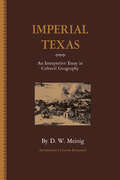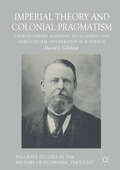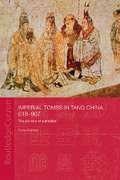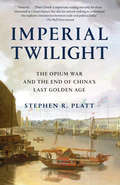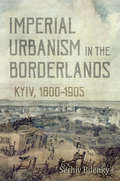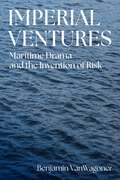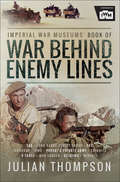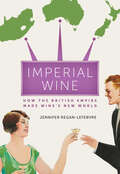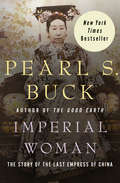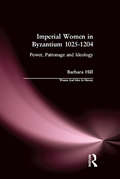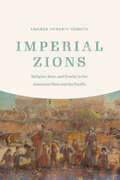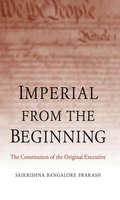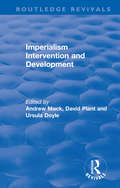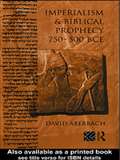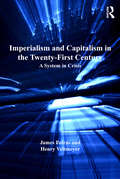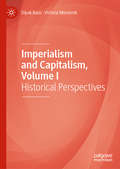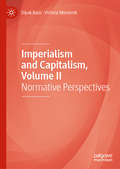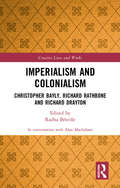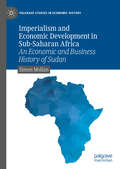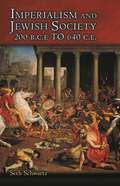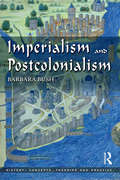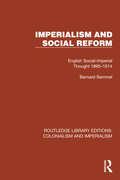- Table View
- List View
Imperial Texas: An Interpretive Essay in Cultural Geography
by D.W. MeinigA &“unique and fascinating&” look at the various peoples of the Lone Star state from colonial times to the 1960s, illustrated with eighteen maps(American West). Imperial Texas examines the development of Texas as a human region, from the simple outline of the Spanish colony to the complex patterns of the modern state. In this study in cultural geography set into a historical framework, D. W. Meinig, professor of geography at Syracuse University, discusses the various peoples of Texas—who they are, where they came from, where they settled, and how they are proportioned one to another from place to place. In addition, numerous illustrations and maps are included, providing impressions of the populations and migrations that helped shape Texas&’s history and culture. &“Geography has produced a few scholars who roam more freely in the world of ideas to produce studies of penetration and insight. Meinig is one of these men, and Imperial Texas is such a study.&” —Annals of the Association of American Geographers
Imperial Theory and Colonial Pragmatism
by David J. GilchristThis book considers the role played by co-operative agriculture as a critical economic model which, in Australia, helped build public capital, drive economic development and impact political arrangements. In the case of colonial Western Australia, the story of agricultural co-operation is inseparable from that of the story of Charles Harper. Harper was a self-starting, pioneering frontiersman who became a political, commercial and agricultural leader in the British Empire’s most isolated colony during the second half of the Victorian era. He was convinced of the successful economic future of Western Australia but also pragmatic enough to appreciate that the unique challenges facing the colony were only going to be resolved by the application of unorthodox thinking. Using Harper’s life as a foil, this book examines Imperial economic thinking in relation to the co-operative form of economic organisation, the development of public capital, and socialism. It uses this discussion to demonstrate the transfer of socialistic ideas from the centre of the Empire to the farthest reaches of the Antipodes where they were used to provide a rhetorical crutch in support of purely pragmatic co-operative establishments.
Imperial Tombs in Tang China, 618-907: The Politics of Paradise (Routledge Studies in the Early History of Asia #Vol. 1)
by Tonia EckfeldIntellectually and visually stimulating, this important landmark book looks at the religious, political, social and artistic significance of the Imperial tombs of the Tang Dynasty (618-907 AD). It traces the evolutionary development of the most elaborately beautiful imperial tombs to examine fundamental issues on death and the afterlife in one of the world's most sophisticated civilizations. Selected tombs are presented in terms of their structure, artistic programs and their purposes. The author sets the tombs in the context of Chinese attitudes towards the afterlife, the politics of mausoleum architecture, and the artistic vocabulary which was becoming the mainstream of Chinese civilization.
Imperial Twilight: The Opium War and the End of China's Last Golden Age
by Stephen R. PlattAs China reclaims its position as a world power, Imperial Twilight looks back to tell the story of the country&’s last age of ascendance and how it came to an end in the nineteenth-century Opium War. As one of the most potent turning points in the country&’s modern history, the Opium War has since come to stand for everything that today&’s China seeks to put behind it. In this dramatic, epic story, award-winning historian Stephen Platt sheds new light on the early attempts by Western traders and missionaries to &“open&” China even as China&’s imperial rulers were struggling to manage their country&’s decline and Confucian scholars grappled with how to use foreign trade to China&’s advantage. The book paints an enduring portrait of an immensely profitable—and mostly peaceful—meeting of civilizations that was destined to be shattered by one of the most shockingly unjust wars in the annals of imperial history. Brimming with a fascinating cast of British, Chinese, and American characters, this riveting narrative of relations between China and the West has important implications for today&’s uncertain and ever-changing political climate.
Imperial Unknowns
by Cornel ZwierleinIn this major new study, the history of the French and British trading empires in the early modern Mediterranean is used as a setting to test a new approach to the history of ignorance: how can we understand the very act of ignoring - in political, economic, religious, cultural and scientific communication - as a fundamental trigger that sets knowledge in motion? Zwierlein explores whether the Scientific Revolution between 1650 and 1750 can be understood as just one of what were in fact many simultaneous epistemic movements and considers the role of the European empires in this phenomenon. Deconstructing central categories like the mercantilist 'national', the exchange of 'confessions' between Western and Eastern Christians and the bridging of cultural gaps between European and Ottoman subjects, Zwierlein argues that understanding what was not known by historical agents can be just as important as the history of knowledge itself.
Imperial Urbanism in the Borderlands: Kyiv, 1800 - 1905
by Serhiy BilenkyIn the nineteenth and early twentieth century Kyiv was an important city in the European part of the Russian empire, rivaling Warsaw in economic and strategic significance. It also held the unrivaled spiritual and ideological position as Russia’s own Jerusalem. In Imperial Urbanism in the Borderlands, Serhiy Bilenky examines issues of space, urban planning, socio-spatial form, and the perceptions of change in imperial Kyiv. Combining cultural and social history with that of urban studies, Bilenky unearths a wide range of unpublished archival materials and argues that the changes experienced by the city prior to the revolution of 1917 were no less dramatic and traumatic than those of the Communist and post-Communist era. In fact, much of Kyiv’s contemporary urban form, architecture, and natural setting were shaped by imperial modernizers during the long nineteenth century. The author also explores a general culture of imperial urbanism in Eastern Europe. Imperial Urbanism in the Borderlands is the first work to approach the history of Kyiv from an interdisciplinary perspective and showcases Kyiv’s rightful place as a city worthy of attention from historians, urbanists, and literary scholars.
Imperial Ventures: Maritime Drama and the Invention of Risk
by Benjamin VanWagonerLinks early modern English drama and empire studies, exploring how staged scenes of maritime peril created a new form of economic uncertaintyImperial Ventures links early modern English drama and empire studies, exploring how staged scenes of maritime peril created a new form of economic uncertainty around the turn of the seventeenth century, amid London’s explosion in commercial colonialism.While the hazards of global maritime trade became increasingly apparent during the late sixteenth and early seventeenth centuries, the word “risk” did not enter English usage until around 1660. The prevailing scholarly narrative has linked uncertainty to concepts such as “chance,” “accident,” and “providence,” but this book reveals that these fragmentary concepts were reordered into an economic abstraction, and that the theater was a key site for that process. Playwrights reached for ways to represent this new uncertainty, and audiences watched perilous voyages set in colonial contexts and dramatized in increasingly typical forms. Imperial Ventures is organized by these forms, with five chapters examining scenes of shipwreck, pirates, enslavement, colonial subjection, and perilous news across a wide range of early modern plays.Benjamin VanWagoner shows how maritime drama connected English venturing to economic vulnerability in increasingly systematic ways, helping to develop the economic logic that would come to be codified as risk. In revealing this process, Imperial Ventures establishes the unique protocolonial status of early modern England—in the theater and at sea—and demonstrates how risk became a perverse instrument for justifying Anglophone imperialism.
Imperial War Museums' Book of War Behind Enemy Lines
by Julian ThompsonAn account of the various units of the British special forces used during the Second World War, perfect for military enthusiasts and WWII history buffs.War Behind Enemy Lines tells the unvarnished story of British Special Forces in the Second World War. While the SAS and SBS remain household names today, there were a plethora of lesser known units, large and small, that played their part before departing the scene. Of special note was the Long Range Desert Group (LRDG) formed in North Africa who imparted their skills to David Stirling’s SAS in the early days. The Special Boat Sections and Squadron and other Royal Marine units inflicted great damage. Popski’s Private Army used heavily armed jeeps effectively in Italy while the Jedburghs parachuted in to assist the French Resistance.In Burma, the Chindits, under the controversial Orde Wingate, conducted deep penetration patrols against the Japanese, suffering heavy casualties from enemy action and disease.Drawing on personal accounts as well as official records, Julian Thompson paints a vivid picture of the operations and contribution of these and other units. He also analyses, using his own experience, the reasons for the resulting successes and failures.There is unlikely to be a more comprehensive and authoritative account of the “Golden Age of British Special Forces.”
Imperial War Museums' Book of War Behind Enemy Lines
by Julian ThompsonAn account of the various units of the British special forces used during the Second World War, perfect for military enthusiasts and WWII history buffs.War Behind Enemy Lines tells the unvarnished story of British Special Forces in the Second World War. While the SAS and SBS remain household names today, there were a plethora of lesser known units, large and small, that played their part before departing the scene. Of special note was the Long Range Desert Group (LRDG) formed in North Africa who imparted their skills to David Stirling’s SAS in the early days. The Special Boat Sections and Squadron and other Royal Marine units inflicted great damage. Popski’s Private Army used heavily armed jeeps effectively in Italy while the Jedburghs parachuted in to assist the French Resistance.In Burma, the Chindits, under the controversial Orde Wingate, conducted deep penetration patrols against the Japanese, suffering heavy casualties from enemy action and disease.Drawing on personal accounts as well as official records, Julian Thompson paints a vivid picture of the operations and contribution of these and other units. He also analyses, using his own experience, the reasons for the resulting successes and failures.There is unlikely to be a more comprehensive and authoritative account of the “Golden Age of British Special Forces.”
Imperial Wine: How the British Empire Made Wine’s New World
by Jennifer Regan-LefebvreA fascinating deep dive into the colonial roots of the global wine industry. Imperial Wine is a bold, rigorous history of Britain’s surprising role in creating the wine industries of Australia, South Africa, and New Zealand. Here, historian Jennifer Regan-Lefebvre bridges the genres of global commodity history and imperial history, presenting provocative new research in an accessible narrative. This is the first book to argue that today’s global wine industry exists as a result of settler colonialism and that imperialism was central, not incidental, to viticulture in the British colonies. Wineries were established almost immediately after the colonization of South Africa, Australia, and New Zealand as part of a civilizing mission: tidy vines, heavy with fruit, were symbolic of Britain’s subordination of foreign lands. Economically and culturally, nineteenth-century settler winemakers saw the British market as paramount. However, British drinkers were apathetic towards what they pejoratively called "colonial wine." The tables only began to turn after the First World War, when colonial wines were marketed as cheap and patriotic and started to find their niche among middle- and working-class British drinkers. This trend, combined with social and cultural shifts after the Second World War, laid the foundation for the New World revolution in the 1980s, making Britain into a confirmed country of wine-drinkers and a massive market for New World wines. These New World producers may have only received critical acclaim in the late twentieth century, but Imperial Wine shows that they had spent centuries wooing, and indeed manufacturing, a British market for inexpensive colonial wines. This book is sure to satisfy any curious reader who savors the complex stories behind this commodity chain.
Imperial Woman: The Story of the Last Empress of China (Colophon #Vol. 3)
by Pearl S. BuckFrom the Nobel Prize–winning author of The Good Earth: the New York Times–bestselling biography of Tzu Hsi, the concubine who became China&’s last empress. In Imperial Woman, Pearl S. Buck brings to life the amazing story of Tzu Hsi, who rose from concubine status to become the working head of the Qing Dynasty. Born from a humble background, Tzu Hsi falls in love with her cousin Jung Lu, a handsome guard—but while still a teenager she is selected, along with her sister and hundreds of other girls, for relocation to the Forbidden City. Already set apart on account of her beauty, she&’s determined to be the emperor&’s favorite, and devotes all of her talent and cunning to the task. When the emperor dies, she finds herself in a role of supreme power, one she&’ll command for nearly fifty years. Much has been written about Tzu Hsi, but no other novel recreates her life—the extraordinary personality, together with the world of court intrigue and the period of national turmoil with which she dealt—as well as Imperial Woman. This ebook features an illustrated biography of Pearl S. Buck including rare images from the author&’s estate.
Imperial Women in Byzantium 1025-1204: Power, Patronage and Ideology (Women And Men In History)
by Barbara HillThis book will be essential reading for anyone studying Byzantine history in this period. It ranges in time from the death of the emperor Basil II in 1025 to the sacking of the city of Constantinople by the Fourth Crusaders in 1204, spanning the rise and fall of the successful Komnenos dynasty. Eleventh-century Byzantine history is unusual in that imperial women were able to wield immense power and in this ground-breaking book Dr Hill explores why this was possible and, equally, why they lost their position of influence a century later.
Imperial Zions: Religion, Race, and Family in the American West and the Pacific (Studies in Pacific Worlds)
by Amanda Hendrix-KomotoIn the nineteenth century, white Americans contrasted the perceived purity of white, middle-class women with the perceived eroticism of women of color and the working classes. The Latter-day Saint practice of polygamy challenged this separation, encouraging white women to participate in an institution that many people associated with the streets of Calcutta or Turkish palaces. At the same time, Latter-day Saints participated in American settler colonialism. After their expulsion from Ohio, Missouri, and Illinois, Latter-day Saints dispossessed Ute and Shoshone communities in an attempt to build their American Zion. Their missionary work abroad also helped to solidify American influence in the Pacific Islands as the church became a participant in American expansion.Imperial Zions explores the importance of the body in Latter-day Saint theology with the faith&’s attempts to spread its gospel as a &“civilizing&” force in the American West and the Pacific. By highlighting the intertwining of Latter-day Saint theology and American ideas about race, sexuality, and the nature of colonialism, Imperial Zions argues that Latter-day Saints created their understandings of polygamy at the same time they tried to change the domestic practices of Native Americans and other Indigenous peoples. Amanda Hendrix-Komoto tracks the work of missionaries as they moved through different imperial spaces to analyze the experiences of the American Indians and Native Hawaiians who became a part of white Latter-day Saint families. Imperial Zions is a foundational contribution that places Latter-day Saint discourses about race and peoplehood in the context of its ideas about sexuality, gender, and the family.
Imperial from the Beginning
by Saikrishna Bangalore PrakashEminent scholar Saikrishna Prakash offers the first truly comprehensive study of the original American presidency. Drawing from a vast range of sources both well known and obscure, this volume reconstructs the powers and duties of the nation's chief executive at the Constitution's founding. Among other subjects, Prakash examines the term and structure of the office of the president, as well as the president's power as constitutional executor of the law, authority in foreign policy, role as commander in chief, level of control during emergencies, and relationship with the Congress, the courts, and the states. This ambitious and even-handed analysis counters numerous misconceptions about the presidency and fairly demonstrates that the office was seen as monarchical from its inception.
Imperialism And The Origins Of Mexican Culture
by Colin M. MaclachlanWith an empire stretching across central Mexico, unmatched in military and cultural might, the Aztecs seemed poised on the brink of a golden age in the early sixteenth century. But the arrival of the Spanish changed everything. Imperialism and the Origins of Mexican Culture "chronicles this violent clash of two empires and shows how modern Mestizo culture evolved over the centuries as a synthesis of Old and New World civilizations. Colin MacLachlan begins by tracing Spain and Mesoamerica s parallel trajectories from tribal enclaves to complex feudal societies. When the Spanish laid siege to Tenochtitlan and destroyed it in 1521, the Aztecs could only interpret this catastrophe in cosmic terms. With their gods discredited and their population ravaged by epidemics, they succumbed quickly to Spanish control which meant submitting to Christianity. Spain had just emerged from its centuries-long struggle against the Moors, and zealous Christianity was central to its imperial vision. But Spain s conquistadores far outnumbered its missionaries, and the Church s decision to exclude Indian converts from priesthood proved shortsighted. Native religious practices persisted, and a richly blended culture part Indian, part Christian began to emerge. The religious void left in the wake of Spain s conquests had enduring consequences. MacLachlan s careful analysis explains why Mexico is culturally a Mestizo country while ethnically Indian, and why modern Mexicans remain largely orphaned from their indigenous heritage the adopted children of European history. "
Imperialism Intervention and Development (Routledge Revivals)
by Andrew Mack David Plant Ursula DoyleOriginally published in 1979 Imperialism, Intervention and Development provides an introduction to key issues in international politics in the post-World War II era. The emphasis is on conflict – particularly the confrontation between East and West and the contention between rich industrialised nations and the poor ‘developing’ nations. The book debates the causes of Western intervention, expansion and counter-revolution in the Third World and the consequences of that intervention for economic development. The spectrum and depth of the articles is both comprehensive and varied, including examples of ‘mainstream’ academic perspectives on the issues examined, incorporating many of the radical critiques of these mainstream approaches. Other more basic material, presupposing little prior knowledge in the field is concerned is also included.
Imperialism and Biblical Prophecy: 750-500 BCE
by David AberbachImperialism and Biblical Prophecy is a radically new interpretation of prophetic poetry. Using more than thirty new translations from the Hebrew Bible, it shows that this poetry is inseparable from imperialism, that each of the three major waves of biblical prophecy which have survived in the Old Testament occurred in response to simultaneous waves of imperialist conquest.
Imperialism and Capitalism in the Twenty-First Century: A System in Crisis (Globalization, Crises, and Change)
by Henry Veltmeyer James Petras Humberto MárquezWe live in a time of dynamic, but generally regressive regime change-a period in which major political transformations and a rollback of a half-century of legislation are accelerated under conditions of a prolonged and deepening economic crisis and a worldwide offensive against the citizenry and the working class. Written by two of the world’s leading left-wing thinkers, Imperialism and Capitalism in the Twenty-First Century takes the form of a number of analytical probes into some of the dynamics of capitalist development and imperialism in contemporary conditions of a system in crisis. It is too early to be definitive about the form that capitalism and imperialism -and socialism-might be or is taking, as we are in but the early stages of a new developmental dynamic, the conditions of which are too complex to anticipate or grasp in thought; they require a closer look and much further study from a critical development and Marxist perspective. The purpose of this book is to advance this process and give some form to this perspective.
Imperialism and Capitalism, Volume I: Historical Perspectives
by Dipak Basu Victoria MiroshnikThis book examines the history of empire and its influence on capitalism. Taking inspiration from Vladimir Lenin’s essay Imperialism, the Highest Stage of Capitalism, the thoughtful chapters explore how workers and resources in Africa, Latin America, and Asia were exploited by capitalist colonizers. Particular attention is given to the empires of Great Britain, Russia, Japan, the Netherlands, and the United States. This book aims to trace the historical development of capitalism and its reliance of colonialism, and is relevant to those interested in economics, development studies, international relations, and global politics.
Imperialism and Capitalism, Volume II: Normative Perspectives
by Dipak Basu Victoria MiroshnikThis book discusses the case for socialism and the models of socialist planning. Through examining different countries, each chapter examines the successes and failures of contrasting socialist policies. The theories and techniques of socialist planning are discussed in relation to the Soviet Union and India, with additional attention given to Great Britain, Scandinavia, and the former Yugoslavia. Imperialism and Capitalism, Volume 2: Normative Perspectives aims to explore the alternatives to capitalism within different sectors and situations. The book is relevant to those interested in economics, development studies, international relations, and global politics.
Imperialism and Colonialism: Christopher Bayly, Richard Rathbone and Richard Drayton
by Alan MacfarlaneImperialism and Colonialism: Christopher Bayly, Richard Rathbone and Richard Drayton is a collection of interviews that are being published as a book for the first time. These interviews have been conducted by one of England’s leading social anthropologists and historians, Professor Alan Macfarlane. Filmed over a period of several years, the three conversations in this volume are part of the series Creative Lives and Works. These transcriptions form a part of a larger set of interviews that cut across various disciplines, from the social sciences and the sciences to the performing and visual arts. The current volume is on three foremost imperial and global historians. Colonialism is intrinsically linked to its imperial past. Christopher Bayly, Richard Rathbone and Richard Drayton, come alive through these conversations in this book. They offer a refreshing perspective to the actions of the colonizer and the colonized, often deriding the actions of the former. Bayly talks at great length about his Indian experience, Rathbone talks about the tempered indifference of the larger academic community towards African history and its oral tradition and Drayton engages his readers with anecdotes and interesting insights into Creole culture. The book will be of enormous value not just to those interested in the subject of History, Culture Studies, Ethnography and Comparative Studies and Literature but also to the uninitiated because of the lucidity which conversations bring to even otherwise opaque discussions.. Please note: This title is co-published with Social Science Press, New Delhi. Taylor & Francis does not sell or distribute the Hardback in India, Pakistan, Nepal, Bhutan, Bangladesh and Sri Lanka.
Imperialism and Economic Development in Sub-Saharan Africa: An Economic and Business History of Sudan (Palgrave Studies in Economic History)
by Simon MollanThis book examines the economic and business history of Sudan, placing Sudan into the wider context of the impact of imperialism on economic development in sub-Saharan Africa. From the 1870s onwards British interest(s) in Sudan began to intensify, a consequence of the opening of the Suez Canal in 1869 and the overseas expansion of British business activities associated with the Scramble for Africa and the renewal of imperial impulses in the second half of the nineteenth century. Mollan shows the gradual economic embrace of imperialism in the years before 1899; the impact of imperialism on the economic development of colonial Sudan to 1956; and then the post-colonial economic legacy of imperialism into the 1970s. This text highlights how state-centred economic activity was developed in cooperation with British international business. Founded on an economic model that was debt-driven, capital intensive, and cash-crop oriented–the colonial economy of Sudan was centred on cotton growing. This model locked Sudan into a particular developmental path that, in turn, contributed to the nature and timing of decolonization, and the consequent structures of dependency in the post-colonial era.
Imperialism and Jewish Society: 200 B.C.E. to 640 C.E. (Jews, Christians, and Muslims from the Ancient to the Modern World #14)
by Seth SchwartzThis provocative new history of Palestinian Jewish society in antiquity marks the first comprehensive effort to gauge the effects of imperial domination on this people. Probing more than eight centuries of Persian, Greek, and Roman rule, Seth Schwartz reaches some startling conclusions--foremost among them that the Christianization of the Roman Empire generated the most fundamental features of medieval and modern Jewish life. Schwartz begins by arguing that the distinctiveness of Judaism in the Persian, Hellenistic, and early Roman periods was the product of generally prevailing imperial tolerance. From around 70 C.E. to the mid-fourth century, with failed revolts and the alluring cultural norms of the High Roman Empire, Judaism all but disintegrated. However, late in the Roman Empire, the Christianized state played a decisive role in ''re-Judaizing'' the Jews. The state gradually excluded them from society while supporting their leaders and recognizing their local communities. It was thus in Late Antiquity that the synagogue-centered community became prevalent among the Jews, that there re-emerged a distinctively Jewish art and literature--laying the foundations for Judaism as we know it today. Through masterful scholarship set in rich detail, this book challenges traditional views rooted in romantic notions about Jewish fortitude. Integrating material relics and literature while setting the Jews in their eastern Mediterranean context, it addresses the complex and varied consequences of imperialism on this vast period of Jewish history more ambitiously than ever before. Imperialism in Jewish Society will be widely read and much debated.
Imperialism and Postcolonialism (History: Concepts,Theories and Practice)
by Barbara BushThis account of imperialism explores recent intellectual, theoretical and conceptual developments in imperial history, including interdisciplinary and post-colonial perspectives. Exploring the links between empire and domestic history, it looks at the interconnections and comparisons between empire and imperial power within wider developments in world history, covering the period from the Roman to the present American empire. The book begins by examining the nature of empire, then looks at continuity and change in the historiography of imperialism and theoretical and conceptual developments. It covers themes such as the relationship between imperialism and modernity, culture and national identity in Britain. Suitable for undergraduates taking courses in imperial and colonial history.
Imperialism and Social Reform: English Social-Imperial Thought 1895–1914 (Routledge Library Editions: Colonialism and Imperialism #33)
by Bernard SemmelImperialism and Social Reform (1960) examines British social-imperialism and the development of social-imperial thought: the promotion of a ‘people’s imperialism’, or the support of the working classes for the imperialist system. It looks at the social and economic background and analyses the various forms of social-imperial thought, including the vigorous strand of imperial-socialists, who asserted that the welfare of the working classes depended upon imperial strength.
